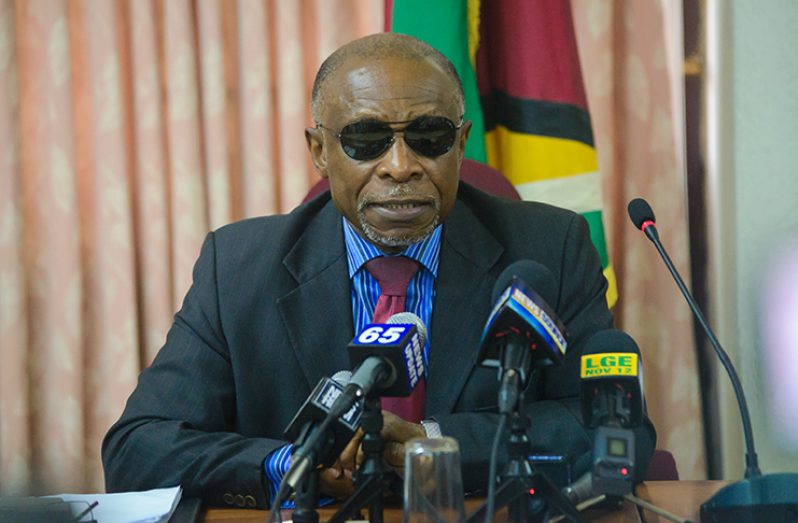IN light of the impending closure of the Trinidad and Tobago state-owned oil refinery – Petrotrin, CARICOM Council for Trade and Economic Development (COTED) is likely to waive the Common External Tariff (CET) to facilitate the purchase of fuel from extra-regional suppliers.
Guyana is among countries within the regional bloc that sources its fuel from Trinidad and Tobago. During a press conference on Monday, Vice President and Minister of Foreign Affairs, Carl Greenidge said the issue came up for discussion when the Ninth Special Meeting of The Prime Ministerial Sub-Committee on the CARICOM Single Market and Economy (CSME), was held last week in Barbados. “The Caribbean Prime Ministerial Sub-Committee looked at this matter, and examined a couple of options that were available and they asked the relevant experts and ministers to explore the matter urgently and to [give] advice,” Minister Greenidge told reporters.
He said that there is recognition that the barrier to importation from outside the region is partially a “fiscal barrier.” “…it arises from the CET, and the ministers agreed, that in the circumstances, the Common Exchange Tariff will have to be waived,” the Guyanese foreign affairs minister said. He noted that other sources are being explored among those, are resources like Jamaica, and Antigua and Barbuda.
He said Guyana like other countries has storage capacity issues. “Guyana of course has special constraints because its own storage capacity is relatively limited, but it is not the only country. So the sense of urgency surrounds the action to be taken and the advice to be provided,” he noted.
Though no timeframe was given, Minister Greenidge said those tasked with analysing the issue were urged to tackle it with a sense of urgency.
NO REQUEST
Meanwhile, in responding to another question on the topic of oil, the foreign affairs minister said that there has been no formal request from Trinidad and Tobago for Guyana to invest in Petrotrin.
He, however, confirmed that within days the two CARICOM member states will sign a Memorandum of Understanding (MOU) for cooperation in oil and gas, and a Framework Agreement for the deepening of bilateral cooperation. He dispelled the notion that the MOU on the Oil and Gas sector was a binding agreement.
“The MOU itself is usually followed by more concrete arrangements between the relevant sectors, it is not by itself a binding instrument,” Minister Greenidge explained.
Since last year, the government had signaled its intent of renewing the Framework Agreement for the deepening of bilateral cooperation with Trinidad and Tobago. The Framework Agreement was signed between the two parties in August 1999 in Port of Spain, Trinidad and was valid for 10 years initially and then renewed for five successive periods, but was never enacted.
“It was a 10-year MOU, it was signed and no riot occurred, no sector was destroyed, there was no apocalypse and I am sure this will not happen on this occasion either, and the same thing applies to the MOU in relation to the Belt and Road Project,” Minister Greenidge added.
Days after calling on the Government of Guyana not to sign the MOU with Trinidad until it examines the particulars of the ‘agreement,’ the Georgetown Chamber of Commerce and Industry (GCCI) said it is supportive of foreign investors to Guyana.
“The GCCI believes that foreign investors have played, and continue to play, an integral role in driving economic growth and national development. In an era of global business, the benefits of international cooperation in key areas of private sector development are undeniable. Technology transfer, skills development, international markets for goods and services are a few areas where readily, the engagement of foreign investors and companies can bode well for private sector development,” the GCCI said in a statement on Monday.
It pointed out that earlier this year it embarked on a series of internationalisation efforts, signing Memorandums of Understanding (MOUs) with several countries – India, Canada and Cuba.
The benefits of these MOUs are currently being realised through bilateral Trade Facilitation Councils that are promoting international engagement for the mutual benefit of the countries’ private sector. “Through this mechanism, several of the chamber’s members have benefitted from joint ventures and partnerships. These endeavours have facilitated an acceleration of the learning curve and reduction in the learning costs of these businesses. These mechanisms have undeniably improved businesses in Guyana,” the GCCI said.
While maintaining that it is receptive to foreign companies and foreign investors, especially those which are interested in partnerships with Guyanese companies, the GCCI said that openness is based on the principles of equity and fairness. “The chamber is supportive of partnering with its Caribbean brothers and sisters in the spirit of regionalism, especially Trinidad and Tobago in the oil and gas sector, to effect a stronger, more integrated Caribbean community,” it said.


.jpg)











